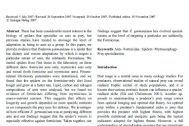Content
There has been considerable recent interest in the biology of spiders that specialise on ants as prey, but previous studies have tended to envisage the level of adaptation as being to ants as a group. In this paper, we provide evidence that Zodarion germanicum is a spider that has dietary and venom adaptations by which it targets a particular subset of ants, the subfamily Formicinae. We reared spiders from first instar in the laboratory on three different diets: formicine ants only, myrmicine ants only and mixed (both formicine and myrmicine ants). Fitnessrelated life-history parameters were determined, and we found that the spiders on the formicine-only diet lived longer and grew at a faster rate. Lipid, carbon and nitrogen compositions of ants were analysed, but we found no evidence of formicines differing from myrmicines in macro-nutrient content. This suggests that effects on longevity and growth depended on more specific nutrients or on compounds the prey uses for defence. We investigated how efficient Zodarion germanicum was at paralysing different ants and our findings suggest that the spider’s venom is especially effective against formicines.



